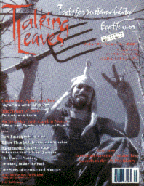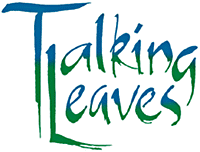
The Story of a Frustrated Shopper
A parable by Steve Hamburg

Everything proceeded with rhythmic efficiency until--of course--the last item: a balky can of tuna fish that just wouldn't scan. The cashier passed it over the scanner repeatedly, twisting and turning it at various angles, the bright red scanning lines flashing across the bar code. Still no price came up. The cashier held the can up to read the number beneath the code. She was about to enter the number into her register when the white-haired gentleman reached over, grabbed her wrist, and lifted her hand from the keys.
"Put the tuna in the bag." he said softly.
"But I need a price." she explained.
"Young lady," he said sternly, "that can of tuna has been scanned and rescanned and scanned again. You have scanned it three times."
"But a price didn't come up."
"A price certainly did come up. The price is zero. The tuna is free."
"But it didn't beep," she explained.
"Then it stands to reason that free items even when scanned and rescanned and scanned again simply do not beep."
It was then that I recognized him. James Baker. I was as surprised as you are that James Baker was in the White Plains Food Emporium buying tuna fish that night, but strange things had been happening recently.
The cashier was unmoved by his argument and, not realizing with whom she was speaking, she tried to reason with Mr. Baker. "But sir, just because it didn't scan doesn't mean it has no price. If you let me key in the SKU number by hand..."
"By hand?" he interrupted, in a voice laced with disdain and incredulity.
"By hand? As opposed to a machine scan? Are you mad? Suppose you make a mistake? Suppose you read a 7 for a 9? Or arbitrarily transpose a digit? Why, you could end up charging me for a side of beef or fifty pounds of lobster." He leaned forward, close to her, his face nearly touching hers.
"No my dear," he hissed slowly and deliberately, "the tuna has no price. It had no price the first time you scanned it, the second time, and the third time. This can of tuna fish is free." His words were smooth and simple and sharp and polished. Like a stiletto.
An impasse. He was holding her wrist, her fingers mere inches above the register keys. Other shoppers, waiting impatiently behind me, began to grumble about the delay. There was some shoving. I stood there wondering how I always managed to pick the slowest checkout line. Suddenly everything fell silent. I felt a hand on my shoulder. I turned. It was Justice Clarence Thomas. Justice Thomas said nothing. He simply pushed me aside to allow Justice Rehnquist to pass. Tall, pale, gray, and regal, Justice Rehnquist strode majestically up to the cashier who was no longer unmoved. She was trembling.
"The tuna fish has no price," Justice Rehnquist intoned.
"But it must have a price," the cashier meekly insisted.
"Very well," he replied in a low monotone. "We know the price. The price is zero."
"But that can not be," she protested.
Justice Rehnquist raised one finger to his lips and said softly, "My dear, we do not need to know the price."
"But why not?" she whispered.
Justice Rehnquist looked at her for a moment then said, "Because we said so."
And with that Justice Scalia reached out from beneath Justice Rehnquist's robes and snatched the can of tuna fish from the cashier. A thin smile spread across his dark, unshaven face. His eyes narrowed. He held the can of tuna fish in his fist. "Because we said so," he echoed, and he dropped the can into the plastic bag. And then in a swirl of black robes, blue suits and silk ties they all disappeared into dark limousines and drove off into the night.
I looked at the cashier and pushed my quart of milk forward. "This register is closed," she said and walked away.
Steve Hamburg is an information system sales and marketing executive. He, his wife, and two children live and buy groceries in White Plains, New York.
�2001* Talking Leaves
Spring/Summer 2001
Volume 11, Number 1
Tools for Sustainability/Eco-Humor
We welcome your letters!
For a sample copy of the Spring/Summer 2001 issue, "Tools for Sustainability/Eco-Humor," send $6 to
